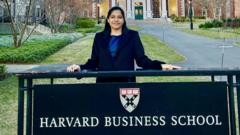Harvard University, renowned for its prestigious academic standing, is now embroiled in controversy as the Trump administration moves to cease the enrollment of international students, leaving many in a state of uncertainty. Shreya Mishra Reddy, an Indian student in the university's executive leadership program, has shared her anguish after learning she may not graduate as planned in July, a disheartening revelation her family is struggling to accept.
Reddy is among approximately 6,800 international students at Harvard, which constitutes over 27% of the total enrollment. With a significant portion of these students hailing from China and India, they represent a crucial financial resource for the Ivy League institution. As the administration's action unfolds, both current scholars and prospective students are left in limbo regarding their academic futures, work opportunities linked to their student visas, and broader implications for the international student community in the U.S.
Harvard has labeled the federal government's declaration as "unlawful," indicating potential legal challenges ahead. The university's commitment to international diversity is at stake, leaving many students hopeful for a resolution. Ms. Reddy expressed her desire for institutional advocacy, stating, "I hope Harvard will stand for us and some solution can be worked out."
The fallout from this federal action ripples deeper, impacting a vast network of foreign students across the U.S. Chinese student Kat Xie, now in her second year, revealed how the announcement took her by surprise, plunging her into a crash course of options to secure her status. As students grapple with daunting financial and logistical burdens, they reflect on the once-welcoming atmosphere that drew them to the U.S.
Concerns further escalated as the Trump administration's enforcement appears to disproportionately target institutions associated with pro-Palestinian movements, leading to investigations and restrictions that complicate the lives of foreign students. Abdullah Shahid Sial, a Pakistani junior, emphasized the distress felt across the international community, showcasing a deep sense of isolation following a period of optimism.
Personal stories of fear and uncertainty echo among the international student body at Harvard, with many expressing hesitation about returning home due to the risk of losing their U.S. reentry. Jiang Fangzhou, a public administration student, articulated the challenges of leaving behind a life built around their education, emphasizing the vulnerability felt by incoming students who turned down other offers to attend Harvard.
The landscape of international education in the U.S. has been dramatically affected, raising questions about the future for students who sought refuge and opportunity in American institutions. As the situation develops, the collective voice of Harvard's international students may yet play a pivotal role in shaping their destinies amid a turbulent political climate.




















